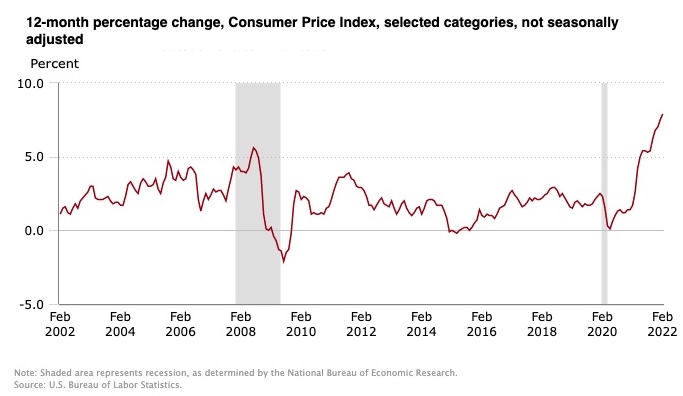Inflation has been on many people’s minds lately.
The U.S CPI chart is on a path to the moon with numbers that we haven’t seen in the last twenty years.
February-2022 has set a new record of 7.9% price change compared to February-2021.
Think about it for a second, the same grocery basket that you had a year ago which cost around say $100, now costs roughly $108, so your money is simply buying less.
Our Story Begins
A few days ago a friend reached out, as he was concerned about his money losing its value and he figured out a plan on how to stop that from happening:
“I heard that I can buy FUTURE CONTRACTS which track commodities like corn, wheat etc in the stock exchange and by doing so, keep my money’s value in line with inflation. What do you think? Did I just find the perfect solution to protect myself against inflation?”
So before I answer my friend’s question with my famous “It’s not that simple” answer, I wanted to first explain why future contracts are awesome and in many ways are responsible for a lot of the wealth that humanity has generated in recent history.
What are Future Contracts?
Imagine you are a corn farmer.
You buy a large field, some very expensive farming equipment, corn seeds, irrigation etc.
You have just invested a lot of capital based on the idea that once your corn is ready to be sold, its price would be similar to the price of corn today and you will be able to pay back your investment and turn a nice profit.
The problem: What if, a few months from now when your corn is ready, the price of corn plummets? You might lose everything and sink in debt even though you worked hard and did everything right!
What this farmer can do instead, is sell a Future Contract today which is a guarantee to deliver a few tons of corn in a few months and get the money for it right now!
It gets even better as the person holding that contract is obligated to pay for transport and storage of said corn once it is ready!
So this is basically a form of insurance that may have some cost associated with it (the price of that future contract might differ from the price that our farmer would be able to get for the same amount of corn today), but the insurance works both ways, as the buyer is able to guarantee the price that would be paid for said corn months in advance.
For example, say the buyer is a cattle farmer that relies on corn as cattle feed, the contract provides the opportunity to plan ahead which is great!
It gets even better: these contracts are liquid and can be traded on the stock exchange so buyers might decide that they are no longer interested in said corn (maybe they want to get out of the cattle business) and they can easily sell that contract to someone else and avoid losses, the sellers don’t mind as they can simply continue growing corn knowing that they have already got paid and someone will transport the goods on the contract’s date.
Note that this fact also opens the door for wall street traders like my friend to speculate on, and perhaps make a profit (or at least give inflation a fight).
Back To My Friend
My friend can buy some corn contracts that will expire in a year or so, and sell them in about a year before they expire.
Their price will track the price of corn and if inflation will continue to rise, so will the price of his contracts - SUCCESS.
Well, while my friend isn’t wrong, I would still advise against it for a few reasons:
Weather ⛈️⛈️: these perishable commodities have seasonal fluctuations in prices and assuming that my friend isn’t really an expert, he might end up with really bad pricing on both ends, as you may expect, there are experts in wall street that trade commodities for a living and they would love feasting on his mistakes.
Timing 📆📆: These contracts have an expiration date so my friend will have to sell that contract by a certain time and it might be a bad time to sell, for example, if my friend is still concerned about inflation, he will have to sell that contract and buy a new one and the price difference might erode my friend’s profits:
If everybody thinks that prices will continue to inflate it makes sense that a contract for one ton of corn for next year would cost more than a contract for that same ton for next month, so my friend will sell a contract for next month and will need to add money to be able to afford the contract for next year.This is a big one: Each corn contract actually relates to 127 tons of corn, now if my friend somehow misses the deadline and the contract expires, he will be in serious trouble as he now needs to figure out what to do with 127 tons of corn 😂🤦♂️.
If you think that I am making this up, read this story
Also you might want to consider the oil price crash of 2020 which caused oil prices to go into negative territory.
How can the price of a commodity be negative? you may ask.
Simple, imagine you are stuck with a contract that expires tomorrow with no one to sell it to and if it does expire, you will be legally obligated to transport and store thousands of barrels of oil, wouldn’t you be willing to pay someone to take that oil away? I would, as far away as possible…
So What’s The Conclusion Here?
Well, obviously there’s no magical easy way to simply negate any risk, let alone inflation risk.
In any case, trading commodities directly will definitely not be an efficient way to get it done.
Most people deal with inflation by diversifying their portfolio keeping in mind that there’s no silver bullet (diversifying your portfolio is made easy using donatello)
There are also ETNs and ETFs that track commodities and do the hard work of rolling contracts for you, but they have problems as well (I’ll probably write about them soon)
Finally, keep in mind that I don’t recommend or advise against buying or holding contracts of corn or any other commodity, this is just a fun little way I found to share what I know about future contracts.
I do recommend buying a few corncubs from time to time and enjoying their sweet and savory taste 😛.
